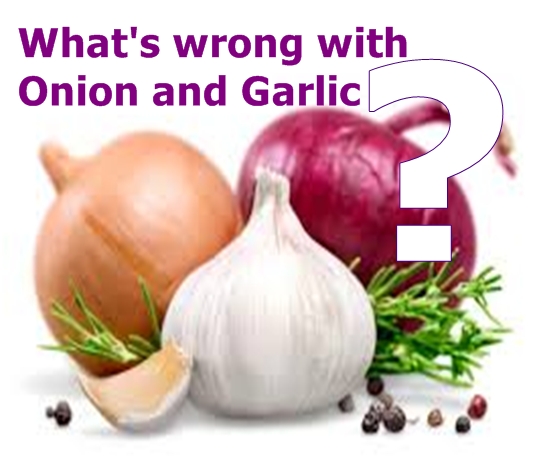It is quite easy to find health benefits of a particular food item especially when we like its taste. This is the reason modern food industry keeps adding some sort of taste to anything they sell. Some companies add taste even to packaged water (and spoil it) to make it stand out. The other tactic they use is add flavors. However, not all flavors are pleasant. You may have noticed that certain flavors you cannot stand although they may be favorite of your next door neighbour. For example, if you believe in good and clean food, you cannot stand someone around you cooking or eating filthy stuff like non-veg. To some, even onion and garlic fall in the same category.
“Wait a minute”, you may say, “non-veg obviously stinks, but why punish onion and garlic?” In fact you may be one of those neighbours who love the smell of onion and garlic. After all, onion and garlic are glorified even by the modern medical science for their ability to fight and even cure some chronic diseases. Why abandon them just because of their smell?
“While onions and garlic cloves do give off strong odors, the sulfur compounds responsible for those aromas are the same substances that provide health benefits if you eat onions and garlic, the Linus Pauling Institute says.” – http://www.livestrong.com/article/387792-what-are-benefits-of-onion-and-garlic/
Research shows that garlic helps balance good (HDL) and bad (LDL) cholesterol in the bloodstream. Garlic produces a great amount of cells in the blood that can help fight different kinds of infections as well as tumors. Garlic also reduces the risk of blood clots which cause strokes. A compound called allicin in garlic is believed to have potent medicinal properties. Although nutritious, garlic has very few calories. It can combat cough and common cold. The antioxidants compounds in garlic could help prevent Alzheimer’s disease and Dementia. Garlic can also help detoxify heavy metals in the body.
Similarly, onion also has multiple health benefits. Its antibiotic, antiseptic, antimicrobial and carminative properties help one stay away from infections. Onions are rich in sulphur, fibers, potassium, calcium, vitamin B, vitamin C and they are low in fat, cholesterol and sodium. If applied correctly, onions can help cure fever, common cold, cough, sore throat, allergies, and other similar diseases. A small piece of onion, when inhaled, can stop or slow down the bleeding through the nose. It is said help in sleeping disorders and digestive system. Onions are also used to cure burnt skin or insect bites.
Onion and garlic have many similarities so far their good and bad effects are concerned. Onions give protection against head, neck and colon cancers, osteoporosis and atherosclerosis. Since it is found to increase the insulin level in the body it can treat diabetes. Similar to garlic, onion also burns the bad cholesterol and protects the good one.
There are many other medicinal as well as nutritional benefits of onion and garlic when consumed or applied under proper supervision. The ones mentioned above are well-known and have repeated mentions on number of websites including this one. Indeed, there is a lot to say in praise of onion and garlic especially when it comes to their usage as medicine.
But, but, but….
Nothing comes free in this world. By the law of nature, good and bad come bundled together. Those who are intelligent weigh this carefully and accept or reject based on the result. Very good stuff can be very bad if misused. The same applies to onion and garlic.

For example, onions can cause drastic decrease in blood sugar level, gastric burning, skin irritation, heartburn, foul breath, low blood pressure and so on. Similarly, there are risks associated with garlic also.
“Botulism is probably the most serious risk associated with garlic. Its sulphurous nature makes it a prime breeding ground for botulism (clostridium botulinum). Botulism is a nasty toxin that can result in major stomach illness sometimes leading to death. The worst danger from botulism comes if raw garlic is stored in oil at room temperature – or even for too long in the refrigerator. Never store raw garlic in oil at room temperature.
Garlic can interfere with certain prescription medicines, especially some anti-coagulants used in surgery. In addition, research published in 2001 concluded that garlic supplements can cause a potentially harmful side effect when combined with a type of medication used to treat HIV/AIDS. Raw garlic is also known to have antiplatelet properties which may present a risk of bleeding to patients taking blood thinning medication such as warfarin. Garlic can also be allergic. Any serious allergy can be potentially life-threatening. As mentioned above, garlic contains allicin, which is extremely powerful and can cause skin reddening, irritation and soreness, and could even damage the digestive tract.” (Source)
Because both onion and garlic come from the same allium family they are found to have similar properties.
Acknowledging that modern science repeatedly goofs up and oftentimes the reality comes to light only after the damage is done, onion and garlic advocates may argue that the negatives mentioned above are questionable. The argument could be that anything taken in excess is harmful, so why single out onion and garlic?
Again, wait a minute! What about Ayurvedic opinion? As we know, ayurveda is India’s ancient medical science given by none other than Lord Dhanvantari, who is celebrated in the Vedas as Lord Vishnu’s incarnation. Despite widespread propaganda against Ayurveda by the modern medical industry, this ancient science is quickly coming back as the world recognizes its matchless ability to accurately treat and cure many so-called terminal diseases.
Ayurveda warns against consuming onion and garlic for various reasons ranging from its adverse effect on physical to mental, emotional, and spiritual health. Ayurveda places both onion and garlic in the category of tamas, or the mode of ignorance; the other two modes being rajas and satva, and satva being the best among all. Being tamasic in nature, onion and garlic induce aggravation, agitation, anxiety and aggression.
Ayurveda believes in the principle of “what you eat is what you think”, and we all know that what we think and contemplate on is what we eventually want to do. In other words, if you eat tamasic food like onion and garlic, you invariably invite tamasic qualities in you. According to Bhagavad Gita (14.8) these qualities are madness, indolence and desire for excessive sleep. It is explained in verse 14.10 that all three modes of nature struggle to control one another and that when the mode of ignorance takes over, darkness, inertia, madness and illusion are manifested.
You may say that you care more about your physical health and go on carefully eating onion and garlic so it doesn’t harm the body. Well, don’t forget that mental health is directly connected to physical health. Even modern science has begun to believe this. By eating onion and garlic you are sure to affect your mind and bring down the level of your consciousness. The tricky part is, this can happen without your knowledge as by eating these alliums you gradually lose the sense of good and bad without realizing it. This is due to the influence of tamo guna, or the mode of ignorance. And when the mind is agitated it drags people into doing all kinds of weird things, which, in turn, cause permanent damage to physical body or even social reputation. I used the term “physical body” in order to distinguish it from the subtle body. Subtle body, which is made of mind, intelligence and false ego, is like a software built in the physical body and controls one’s thought process.
Kurma Dasa, the famous “Australia’s Vegetarian Guru” has following to say about why he doesn’t take nor use onion and garlic in his recipes.
“The Taoists realized thousands of years ago that plants of the alliaceous family were detrimental to humans in their healthy state. In his writings, one sage Tsang-Tsze described the Alliums as the “five fragrant or spicy scented vegetables” – that each have a detrimental effect on one of the following five organs – liver, spleen, lungs, kidneys, and heart. Specifically, onions are harmful to the lungs, garlic to the heart, leeks to the spleen, chives to the liver and spring onions to the kidneys. Tsang-Tsze said that these pungent vegetables contain five different kinds of enzymes which cause “reactions of repulsive breath, extra-foul odour from perspiration and bowel movements, and lead to lewd indulgences, enhance agitations, anxieties and aggressiveness,” especially when eaten raw.
Back in the 1980’s, in his research on human brain function, Dr Robert [Bob] C. Beck, DSc. found that garlic has a detrimental effect on the brain. He found that in fact garlic is toxic to humans because its sulphone hydroxyl ions penetrate the blood-brain barrier and are poisonous to brain cells.” – http://kurma.net/essays/e19.html
In order to substantiate this, he adds that “according to Reiki practitioners, along with tobacco, alcohol and pharmaceutical medications, garlic and onions are among the first substances to be expelled from a person’s system. Even Homeopathic medicine comes to the same conclusion when it recognizes that red onion produces a dry cough, watery eyes, sneezing, runny nose and other familiar cold-related symptoms when consumed.”
Besides, eating onion and garlic gradually builds up a particular unpleasant body odor that no amount of perfume can suppress. Wouldn’t it be embarrassing for you if someone politely moves away from you in search of fresh air? Also, bad body odor indicates bad health. It’s all connected.
For the followers of Vedic scriptures, especially Brahmans and Vaishnavas, there are more compelling reasons for not eating onion and garlic. There are sastric injunctions prohibiting certain food items during normal course of life, while performing certain rituals, and during certain days or months. We have to understand that not a single word of the Vedas is non-scientific. If modern scientists and researchers can find out the reasons behind certain food restrictions given in the Vedic scriptures, it will be considered their success. If they cannot, it does not, in any way, dilute the authenticity of such injunctions. So far their findings conform to the directives given in the Vedas, we accept their views; if they differ, we reject them. It is that simple. The above-mentioned scientific findings on onion and and garlic, especially about their benefits, are welcome as they conform to the information given in the Vedic scriptures. Until now, modern science has not understood the dangers of consuming meat and wine but if they advance in the right direction it is sure to bring them to Vedic conclusion of no non-veg, no onion and garlic, and no intoxication.
There are mentions in the Vedic scriptures of how onion and garlic were originally produced. One mention says it came from the meat of a cow that was being sacrificed in fire by a sage. As per the ritual, any animal sacrificed in fire by the priest is rejuvenated by chanting Vedic mantras. This is the power of Vedic mantras but these days there is no qualified brahmana who can vibrate such mantras perfectly so animal sacrifices are prohibited in this age. When the sage was creating a new body for the sacrificed cow, he found a piece of flesh missing as his wife had thrown it in a nearby place. From that grew onion and garlic.
Another narration suggests that onion and garlic were produced from the mixture of blood of two demons and the nectar that came out after churning of the milk ocean by suras and asuras. The two demons, whose heads were severed by Lord Vishnu by His Sudarshan chakra while they were about to swallow the nectar, are Rahu and Ketu. It is said that onion and garlic were produced from the blood that fell on the ground. It is further explained that since the blood was mixed with nectar, its product, namely onion and garlic possesses powerful properties to cure diseases, but because it was demon’s blood, those who consume it become victims of demoniac mentality. This is what is referred to as tamasic qualities in Bhagavad Gita, and this is why Ayurveda has put onion and garlic in the category of tamasic food.
One more incident is described in Varaha purana wherein it says that formerly in the fight between devas and asuras, King Bali was defeated by the suras. The blood that fell on the ground from his wounds grew into onion and garlic.
We also hear an account supposedly narrated by Srila Prabhupada to some congregation members after he mentioned that eating onion and garlic is as bad as eating cow’s flesh. The story goes like this: a yavana king used to slaughter cows on regular basis but before the slaughter, he would call a brahmana priest to chant mantras to the effect that “in this life these people slaughtering you, but in the next life you will get the chance to slaughter them”.
“So one time a brähmana came there but he felt lusty and he wanted to eat the cow’s flesh also. However, the system was that he was not allowed to see the slaughter going on, he was supposed to offer his prayers and then leave. So he hid in a corner and witnessed the butchering. After the Muslims had all taken their share of the dead cow and departed, the brähmana came to that spot and he found an ankle of the cow. Because he was not supposed to eat any meat, he took the cow’s ankle into the forest and buried it with the plan that he would return in the night, cook it and eat it. When he came back he dug out the cow’s ankle and found to his great surprise that it had turned into onion and garlic.
Haridäsa said that Prabhupäda told the Malhotras that the cow’s hoof transformed to garlic and the ankle became onion; garlic looks like a cow’s hoof, and just as the cow’s ankle has several layers of flesh similarly the onion has several layers and is the color of flesh. He finished the narration by telling them that when you eat garlic it makes a bad smell come in your mouth and when you cut onion it makes tears come out of your eyes. The tears come because the cow was crying that in Kali yuga even the brähmana wants to eat onion.” (Transcendental Diary by Hari Sauri Dasa)
We can see there are different historical references found in the Vedic scriptures. This may raise a question as to which one is the right one. Since there are number of translations of Vedic texts by people with different motives, it is difficult to ascertain which version is the most accurate one but it is sure that at least one of them is, and possible that all of them are and happened at different times in the past. Whatever the case, the central point remains: onion and garlic have tamasic origins like flesh, blood and bones. That itself is enough reason, at least for civilized people, not to eat them.
Apart from historical accounts, some Vedic verses directly prohibit consumption of onion and garlic along with other items. The following scriptural references are taken from http://www.iskcondesiretree.com. The same references are found elsewhere as well.
In the Kurma Purana it is said: “One should avoid eggplant, plantain, safflower, asmantaka, onion, garlic, sour cereal, and the sap of trees.”
In the Padma Purana, Padma Purana, Brahma Khanda 19.10, Srila Sukadeva Gosvami says:
palandu lasunam sigrum alambum grjanam palam bhunkte yo
vai naro brahman vratam chandrayanam charet
TRANSLATION: O sages, one who eats garlic, onions, sigrum (a kind of plant), turnips, bottle gourd and meat, that person should observe a chandrayana fast.
Here the recommendation to observe chandrayanda fast is meant for prayaschitta, or atonement. In other words, eating the above items are considered sinful.
Quoting from Kurma purana, Hari Bhakti Vilasa 8.158,159 says:
vrntakam jalisakam kusumbha smantakam tatha
palandu lasunam suklam niryasan chaiva varjayet
grjanam kinsukan chaiva kukundan cha tathaiva cha
udumbaram alavun cha jagdhva patati vai dvijah
TRANSLATION: One should not eat eggplant, banana leaves, sunflower leaves and asmantaka leaves, onions or garlic. One should not eat sour gruel (a thin watery porridge) or the juice of the tree. One should also give up turnips and beetroots, carrots, kinsuka, forest figs, and white pumpkin. If the twice born persons eat these things, they all become fallen.
Garuda Purana 1.96.72 says:
palandulasunadini jagddhva chandrayanam charet
sraddhe devanpitrnprarcya khadanmamsah na dosabhak
TRANSLATION: By eating garlic and onion one becomes sinful and as atonement one should perform Chandrayana.
Saknda purnana 40.9 says: “Onion, stool-thriving pigs, Selu, garlic, Goplyusa (milk of a cow before the lapse of ten days from calving), Tanduliya (a grain growing in faecal rubbish) and mushrooms- all these are to be avoided.”
Shiva Purana 7.10-12 says: The householder taking the rite shall avoid heavy indigestible pulses like Nispava, Masurika etc., stale food, defiled food, brinjals, gourds, cocoa-nuts, garlic, onion, intoxicating beverages and all kinds of meat.
Padma purana Vol. 42, 4.56.19b-24 says the following:
(But) “he should avoid stalks of lotuses, safflower, gold or silver, onion, garlic, sour gruel, a thick fluid substance; so also chatraka (a kind of mushroom), vidvaraha, greasy milk of a cow during the first seven days of calving, vilaya (a particular product of milk) and mushrooms. By eating the small red variety of garlic, blossoms of kimsuka, a gourd, so also udumbara, bottle-gourd, a twice-born becomes fallen.”
Similarly, Varaha Purana 16.11b-15 advises to avoid the following items in a Sraddha ceremoney: Garlic, onions, globular radish and Karambha (groats or flour mixed with curds), and other articles devoid of smell and with no taste. According to Manu-samhita 5.5, garlic, leeks and onions, mushrooms and (all plants), springing from impure (substances), are unfit to be eaten by twice-born men, and Manu samhita 5.19 declares that a twice-born man who knowingly eats mushrooms, a village-pig, garlic, a village-cock, onions, or leeks, will become an outcaste.
In conclusion, while onion and garlic may have their own benefits, the risk associated with it outweighs the benefits. Those who are practicing spiritual life must refrain from onions and garlic as they simulate sex desires, which is the worst enemy of spiritual progress. Apart from that, as we read above, these alliums are said to have non-veg origins. And on top of all, Vedic scriptures and previous acharyas have prohibited their consumption for aspiring spiritualists.
There was a time when I also ate onions and garlic. Now I don’t. And you know what? I am so happy about it. What do you think? Do you want to give up eating onion and garlic but have difficulty doing so? Find out from others how they did it and hear from them how they too are happy about it. After all, giving up onion and garlic is in the interest of your own health; physical, mental, and spiritual.




































